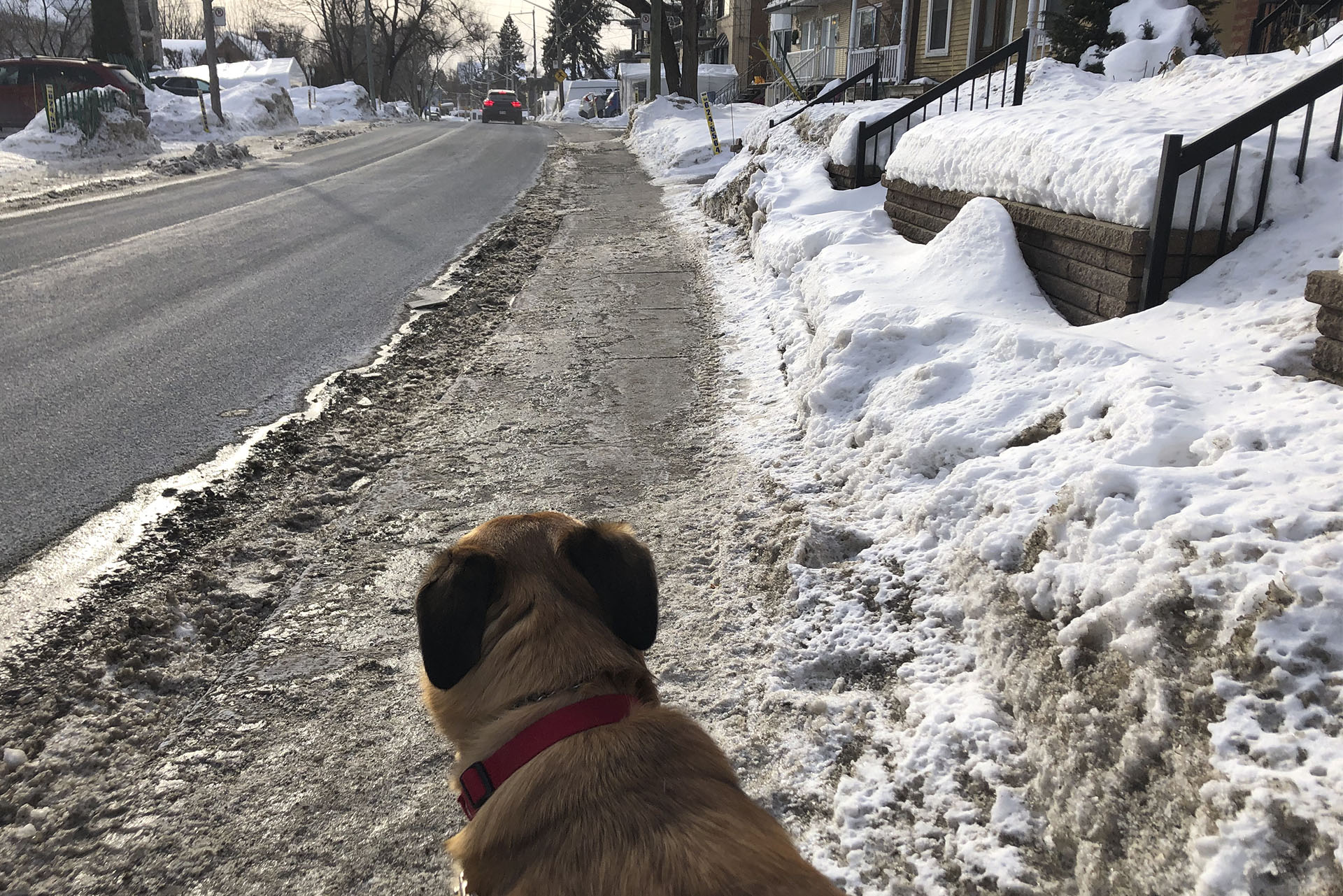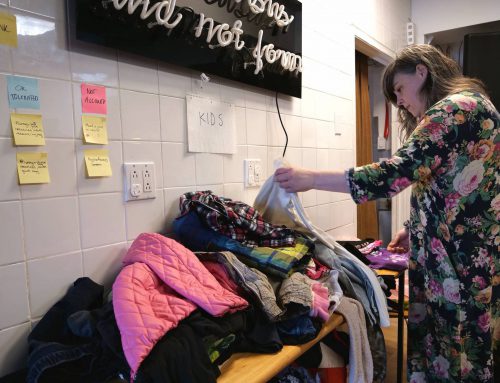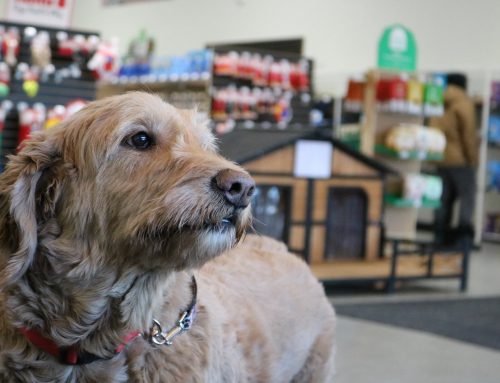BY Liam Hennessy & Lauren Cassandra
The last thing Dr. Adriana Ionescou expected to see when a client brought their four-month-old German shepherd in for vaccinations was a mouthful of plaque-ridden adult teeth. The only person more baffled than her was the animal’s owner. He learned that the puppy he’d purchased from a breeder on Kijiji breeder was actually a middle-aged dog suffering from stunted growth.
“In the last few months we’ve had cases where owners will pay a lot for a pet and come in claiming they have a rare breed of animal, when in reality it’s a domestic breed, unvaccinated and covered in mites or parasites,” says Ionescou.
The high demand for puppies generated by isolation during the pandemic has driven many aspiring pet owners to make impulsive purchases. Some venture to buy pets through online marketplaces and unethical breeders, not anticipating the host of health issues or behavioral problems that may follow.

People often disregard shelter dogs, not knowing they have the potential to be amazing pets. Photo courtesy of the Montreal SPCA.
Groomers, veterinarians and breeders have had to modify their businesses in order to cope with the high demand. While the Montreal SPCA was not immune to these changes, it did manage to stay ahead of the curve according to executive director Elise Desaulniers.
“Like everybody else, we had to review all of our processes during the pandemic. There have been moments when we were short-staffed, but overall we didn’t suffer too much because we put in place a series of mechanisms to control intakes based on our capacity,” she says. “We also help people find alternatives to bringing their animal to the shelter.”
From January 1 to March 31, 2020, the Montreal SPCA recorded 976 unique animals adopted (around 325 per month). From March 31, 2020 to Feb. 1 2021, the number was 2,623 (closer to 262 per month), which constitutes an approximate 19 per cent decrease in their average monthly adoptions after the arrival of COVID-19.
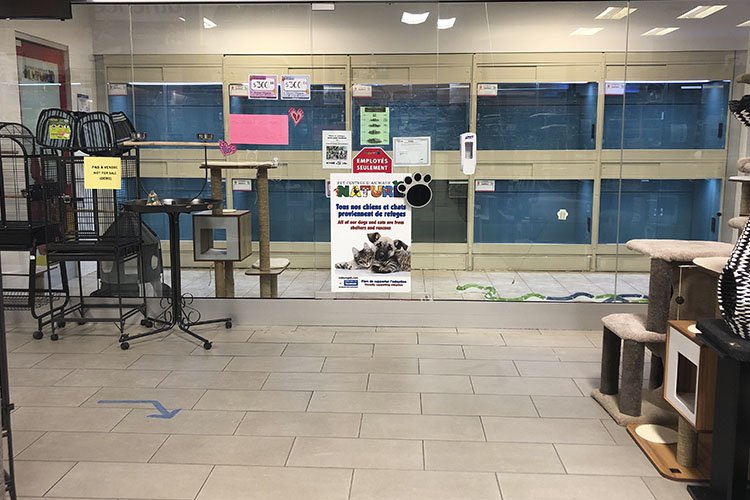
Due to COVID-19, pet stores are no longer housing animals from the SPCA. Which may be leading many aspiring pet owners to search for alternative, questionable, means to adopt a dog. Photo by Lauren Cassandra.
Although these numbers may be related to changes to the organization’s services during the pandemic or more dogs finding forever homes, it could also indicate an increased number of people opting to purchase an animal from a breeder rather than adopt a shelter pet.
Ora Marcus breeds and shows championship poodles from her business Ormar Standard Poodles in Montreal. She says many pet owners are being victimized.
“These so-called ‘breeders’ – although I would never label them as such – are basically putting together two genetically untested and untitled dogs in their backyard to mate and produce a litter. They end up with shelves full of puppies for sale, and many times have three litters consecutively to end up raising upwards of thirty-five puppies all at once,” explains Marcus.
“The puppies are sold quickly, between six and eight weeks, and the buyer is lucky if these so-called ‘breeders’ offer a forty-eight hour health guarantee.”
Most veterinarians and breeders agree that a puppy should be separated from its mother when it’s at least seven to eight weeks old. Before this, puppies are in an early socialization period, essentially learning to be dogs.

Puppies should not normally be removed from their mother until they’re at least seven weeks old. Photo courtesy of Asher Cohen.
According to Marcus, one of the problems is the lack of puppy “lemon laws” in Quebec, meaning that breeders have no obligation to take back a puppy with health problems after the transaction is complete.
“Right now it’s incredibly expensive to get a dog from the Canadian Kennel Club, and wait times can be upwards of a year,” says Ionescou. “Because of this, people have started adopting dogs internationally from websites based in places like the United States and Korea.”
Ironically, she adds that many of these dogs are simply shelter dogs from a different country, who often act as carriers for viruses and diseases when they’re shipped across borders.
The increased demand for dogs may have also contributed rising cases of dog theft in Montreal. Video by Lauren Cassandra.
Dr. Anna Lee, a veterinarian working in Canada and the United States, has witnessed vets all over North America being “…bombarded for appointments since the start of the pandemic.” Despite this, she says that it may not necessarily be due to an increase in unlicensed breeding.
“I suspected that it was a result of all the shelters being empty and owners spending more time at home to notice more health issues,” she says. However, she still shares the concern of many professionals that too many people fail to educate themselves about the adoption process before committing to twelve or more years with an animal.
“Usually what happens is that the person spends thousands of dollars purchasing a purebred cat or dog and when something goes wrong – which is very often the case with many purebreds – they have no money left to spend on diagnostics or treatment so they have no choice but to surrender the animal or euthanize,” says Lee.
The Canadian Kennel Club (CKC), the primary registry for purebred dogs in Canada, aims to regulate the sale of puppies from irresponsible or fraudulent breeders by providing aspiring pet owners with resources like their Puppy List database.
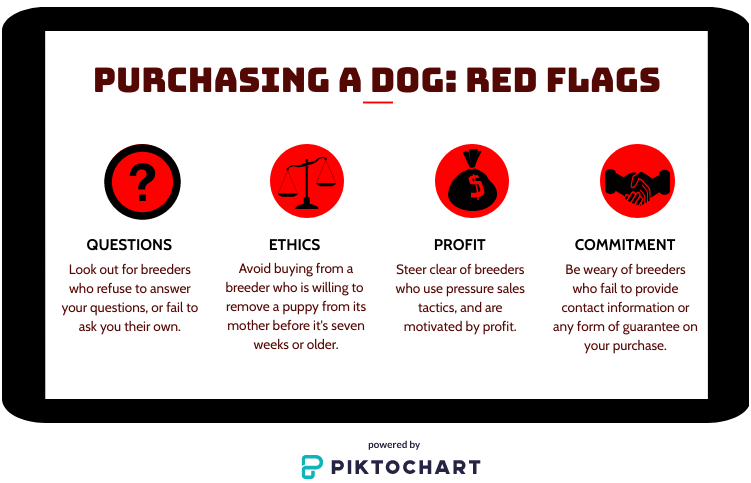
What are the red flags when purchasing a dog? Media by Liam Hennessy.
But Marcus thinks it isn’t enough.
“The CKC does not, nor has it ever got involved in disputes and has no interest in what happens outside of their organization’s by-laws. The CKC by-laws do not include in-depth screening of breeders or stringent check-ups on breeders’ practices,” she says.
“They are interested in the members abiding by their by-laws, one of which states that every purebred puppy is eligible for CKC registration.” According to her, this includes the puppies of mass producers’ and backyard breeders as well as the conscientious and knowledgeable breeders.
Ionescou, on the other hand, believes the CKC is accomplishing what it set out to achieve. According to her, CKC-registered breeders generally do a great job regarding the ethical treatment of their animals. “They vaccinate, de-worm, and microchip their dogs. They really take care of them – they even do testing for genetic diseases,” she says.
In her eyes, the issue isn’t certified breeders. Instead, the problem revolves around the high demand for pets on these registries; people can end up paying huge sums for a dog, not to mention being waitlisted for extended periods by the CKC. This often leads to impatient people looking for irresponsible breeders to help them skip the wait.
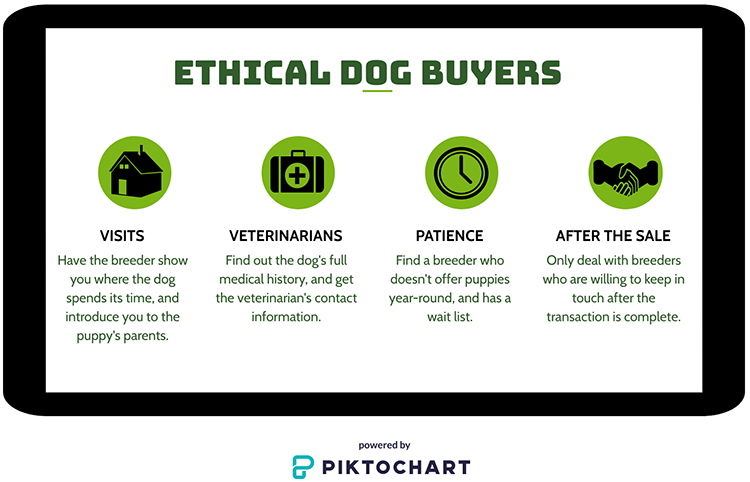
What makes a dog buyer ethical? Media by by Liam Hennessy.
Ianescou says the issue of unethical breeders is a difficult one to regulate, and apart from educating the public, there isn’t much that can be done to dishearten backyard breeders.
“Usually you have to denounce the breeder, but I’ve seen cases where a breeder will take down their website after a sale and disappear,” she says, adding that not being able to get a phone number or home address from a breeder should be considered a serious red flag.
“We had a case where a pet came in full of mites and fleas, severely underweight, but the new owner purchased it in the parking lot of a Tim Horton’s without getting the breeder’s name or contact information,” she says.
